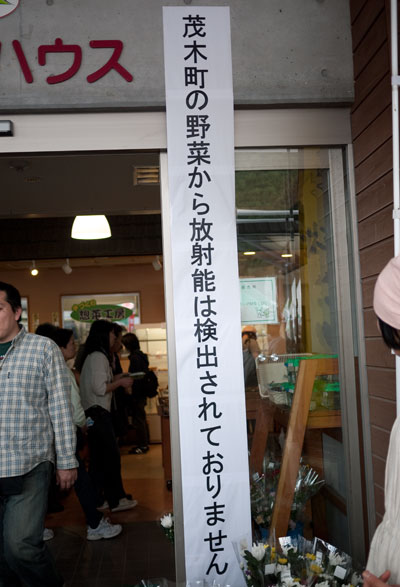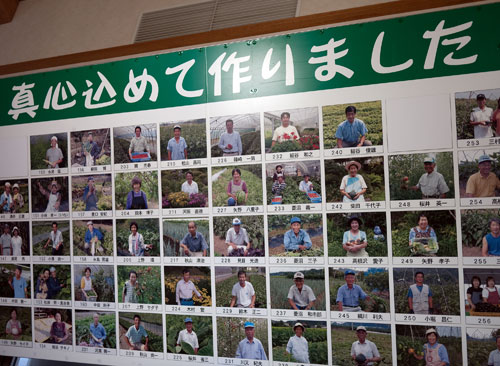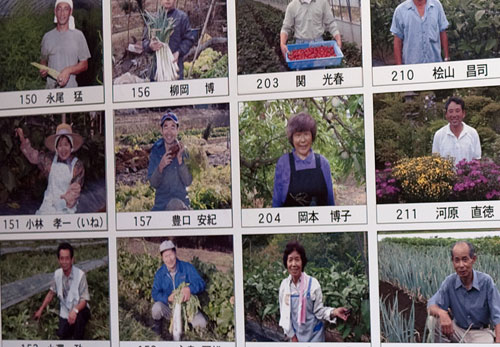Organic and natural farming article in The Japan Times - how/where to shop (including Michi no Eki)
This month's Japan Times article by me is about organic and natural farmers and retailers in the Kanto region of Japan (that's the area that includes Tokyo), including the thorny subject of how they are dealing with radioactive substance contamination on their crops. Because of space constraints I had to leave a lot out of course (that's the nature of newspaper articles) so here are some supplemental things.
"Organic" and other terminology in Japanese
In Japan several terms are used for produce that is farmed using methods that are usually lumped together as 'organic' in the west. This is because to be able to formally label your produce as yuuki (有機、ゆうき), the Japanese word for organic, you are required to get JAS (Japan Agricultural Standards) certification from the Ministry of Agriculture, Forestry and Fisheries (MAFF). This page on the MAFF site leads to information documents. This unofficial page has info in more user-friendly English.
As I stated in the article though, many small producers do not get JAS certification. There is a fee, and the certification must be renewed every year. Plus some farmers object to the certification requirements (saying they are too lax, etc.) So other words to look for are munouyaku (無農薬、むのうやく) which means 'no agricultural chemicals', mukagaku hiyou (無化学肥料, むかがくひりょう)which means 'no chemical fertilizers', and shizen nouhou (自然農法 しぜんのうほう) or 'natural farming methods'.
The last term is used by farmers who grow produce the way Yasunori Toyoguchi, the guy featured at the top of the Japan Times article - using no fertilizers at all, not even manure (some natural farming advocates do use vegetable based fertilizers and compost, while others don't even use those), letting weeds grow between plants, gathering seeds from plants allowed to go to seed to use for the next crop and so on. "Green manure" is sometimes used - in Toyoguchi-san's case he uses renge or Chinese vetch plants. (Typical European green manure crops are alfalfa and clover.) If you want to learn more about "natural farming" there are several books out in English about it, such as The One Straw Revolution: An Introduction to Natural Farming. I'll have more about Mr. Toyoguchi's farm in another post.
Contact info for places mentioned in the article
The small farm run by Mr. Toyoguchi and his lovely girlfriend Kaoru Oidaira is called Tamayura Souen(たまゆら草苑). They are so low-tech that they aren't online yet, and don't even have an email address - so if you're interested in what they have to offer, please try contacting them by phone or fax at 028-563-0212, in Japanese only. They are in Motegi, Tochigi prefecture. They sell things like rice, vegetables, and baked goods, including thse ingredibly addictive amaranth crackers called "amaran-yaki" - made from their own no-chemical amaranth plants, of course. They will ship to you - payment is via Yuucho (the post office) bank only. You can also find their vegetables in season and baked goods year-round at the Motegi michi no eki or roadside station. Motegi itself is a nice daytrip from Tokyo. It's famous as the last stop on the Maoka Railway, which features a steam engine.
Sukoyaka Hiroba is a natural/organic food and sundries store in Tozuka, Yokohama. They do have a web site and their phone number is 045-881-7636. They prefer to deal in Japanese only, but try simple English...it may work. They carry a few locally grown natural-farming method vegetables from Suzuki Nouen, a farm nearby, plus organic fruits and so on from elsewhere. But this is the place to go in Yokohama if you're looking for all kinds of grains, alternative foods, and stuff that are grown without chemicals. They take all major credit cards and will ship nationwide (free shipping for orders aboe 8000 yen). If you'd prefer to go in person, their store is in an office building right off the Tozuka stop on the Yokohama Metro Blue line.
Yoshinori Kaneko is an elder stateman of the organic farming growing scene in Japan, and his farm is called Shimosato or Frostpia Farm. They don't seem to sell directly to the public, but do offer tours and lectures about organic farming. You can also check out the numerous books Mr. Kaneko has written (all in Japanese only) on Amazon Japan. I especially recommend this one, which not only shows you how to grow organically but a bit about heirloom vegetables varieties in Japan too.
Where else to look for organic/no-chemical produce
Some regular retailers, especially department store food halls, do carry some yuuki (certified organic) produce. Look for 有機 on the tag.
If you're in central Tokyo, check out Robbie Swinnerton's review of an organic market in Aoyama, run by a UK concern. Note that most of the produce is imported however. Robbie also has a review of a 'straight from the farm' style restaurant in Roppongi.
Many small 'organic' farmers send their produce (including rice) directly to consumers, via CSA-type schemes; you can also order specific items if they're in season. Keep in mind that most if not all of these small farmers deal in Japanese only. So you may want to have a Japanese speaking friend help you out. You can grower-sellers by region on Yuukinou Shuunou Net, which lists organic/natural farmers who will sell directly to the public around the country.
Shimosato (Frostpia) Farm, mentioned above, is in Ogawa-machi, Saitama, a hotbed of organic farming - mainly due to Mr. Kaneko. Many of his students have gone on to open their own farms in the area. There is a listing of them here - if you're in the area see if any will ship to you. (Incidentally, Ogawa-machi just happens to be where my mother grew up. My aunt was the one who alerted me to the organic-farming-hotbedness of the town.)
Kuno Nouen, one of those farms in Ogawa-machi, offers regular CSA-type shipments via their web site. Credit cards are accepted. They did stop all fresh-produce shipments after the nuclear power plant accidents (even though the radioactive element levels on their produce were far below safety limits) so you inquire as to what they have first.
Michi no eki or roadside stations for farmers's produce
Finally, I mentioned Motegi's michi no eki or 'roadside station' above. Michi no Eki are a fairly recent government-led initiative intended to bring the increasing number of leisure and weekend drivers together with local producers. (Young families in particular tend to get around by car rather than train these days, especially on the weekends.) Michi no eki usually have a regional products store, a farmer's market, fast-food or sit down restaurants, playgrounds for the kids, and so on. They are good places to check out what local farmers are offering, should you have a car.
This sign was posted prominently at the entrance to the farmer's market section of Motegi's Michi no Eki in mid-May. It says "No radiation was detected on Motegi's vegetables". It did look like plenty of people were buying the vegetables in any case.

There was also a big billboard with numbered pictures of the local farmers who were selling their wares at the market. Each bag of greens or punnet of strawberries was marked with the number that corresponded to the farmer's picture. Most are conventional farmers, but there are several organic/no-chemical farmers besides Mr. Toyoguchi too. The text above the hundreds of photos says, "Grown with our sincere hearts".

Here's a closeup of a section of the photo billboard. Mr. Toyoguchi is at number 157. Just in this small community, nearly 300 growers were shown on that billboard.

Japan is mostly a country of small farms and small growers, with a few exceptions. And it's much easier to emphasize, I think, with the plight of small scale farmers like these, or the ones in really serious circumstances in parts of Fukushima. I find myself doing that a lot.
If you enjoyed this article, please consider becoming my patron via Patreon. ^_^

 Welcome to Just Hungry, where we serve authentic Japanese recipes and more! I'm
Welcome to Just Hungry, where we serve authentic Japanese recipes and more! I'm 













Comments
MN
29 May, 2011 - 21:03
Permalink
Re: Organic and natural farming article in The Japan Times ...
Thank you for posting this Maki! I'll be sure to look some of these people up next time I'm in Japan (and have a small group of Japanese friends who can help me out). I'd love to visit an organic farm one day too, if that's ever possible. :)
backform
30 May, 2011 - 12:12
Permalink
Re: Organic and natural farming article in The Japan Times ...
Great article. I think it is soooo important to support the local farmers who have such a hard time now and to inform the people where to buy healthy organic food.
Mom6
30 May, 2011 - 15:16
Permalink
Re: Organic and natural farming article in The Japan Times ...
This is great information. Any chance you could find (or direct me to) similar information in English for northern Japan (Aomori Prefecture, or specifically, the Misawa area?)
Thank you!
Sinaia
30 May, 2011 - 15:32
Permalink
Re: Organic and natural farming article in The Japan Times ...
Thanks for the article, have been looking for that kind of info for quite some time
Robbie Swinnerton
30 May, 2011 - 17:51
Permalink
Re: Organic and natural farming article in The Japan Times ...
Hi Maki, and many thanks for linking through to my last week's pieces in the JT.
I should point out that the organic element of most Daylesford products is based on the UK definition (per Soil Assn. standards and requiring certification) rather than the looser Japanese version.
BTW, I dropped by the other day and was disappointed to see the organic produce display has been drastically cut back, just a couple of carrots/lettuces in a cool unit. Obviously not enough demand among the (health-conscious) Aoyama ladies who lunch...
maki
31 May, 2011 - 04:36
Permalink
Re: Organic and natural farming article in The Japan Times ...
Hi Robbie, thanks for stopping by! I think that the future of organic food in Japan is probably through home delivery (takuhai)...there are already companies that do this to an extent, such as Daichi (which I did not mention in my post because I'm not a huge fan of their sometimes confusing newsletter/catalogs). I suspect most people who go to Aoyama don't expect to be buying vegetables and hauling them home ^_^;
Folly
30 May, 2011 - 18:16
Permalink
A farmers co-op in Hiroshima
During a recent weekend in Hiroshima, right on the main artery of a downtown shopping arcade, I was taken to a small, bustling, no-frills food store. It took me a while before I realized that I was in a local farmers co-op.. I think that they were organic, but can't swear to it. It was exciting to see how small farmers are joining together to get their goods out to the public. Unsure of what I could actually get back into the U.S., I came away with some mushroom tea and vacuum packed pickles. But I would have loved to buy some of the varieties miso or seafood.
elle marie
31 May, 2011 - 04:37
Permalink
Re: Organic and natural farming article in The Japan Times ...
I can't really say much on how lax JAS compliances are, but I do always look for their mark, I go to a small, local super to buy from local farmers in the Chubu/Kansai region, as for more organic options I shop on Rakuten... OFTEN.. (maybe too often).."giggles"
Michelle M.
31 May, 2011 - 07:07
Permalink
Re: Organic and natural farming article in The Japan Times ...
I love the bulletin board with all of the farmers' photos on it, how wonderful to see the person who grew your food! I'm really loving your articles on Japan and how things are after the earthquake. I am so thankful to read that many things are back to normal. People seem to really look after each there, I wish that happened more in the US. (By the way, I was quite touched by the person who sent your mother toilet paper, what a wonderfully humane gesture!)
anon.
31 May, 2011 - 17:30
Permalink
cover crops
Vetch is used in the US also, or at least in New England where it ends up growing everywhere along roads.
lindsay
1 June, 2011 - 21:34
Permalink
Re: Organic and natural farming article in The Japan Times ...
great post on organic farming in Japan!
i used to live in Niigata where a lot of rice is grown, many rice farmers there are reluctant to change because of the security that the Japanese Rice Co-op offers them.
But, a good friend of mine is a rice farmer who grows organic rice! Niigata rice is the best rice in Japan (according to people in Niigata, of course!). my friend's name is Kazuyuki Kusama and he speaks fairly good English. His family has been growing rice for 8 generations! He ships rice to people (mostly in Tokyo) but would be a great resource for English speakers who want a personal connection to top quality organic rice.
This is his information in Japanese: http://www.sancyoku.jp/shopinfo?ctc=0211&shc=0010&backURL=http://www.san...
but you can also find him on Facebook (where he mostly interacts in English)
tom
3 June, 2011 - 01:04
Permalink
Re: Organic and natural farming article in The Japan Times ...
Great article and good to see some young/mid-life guys leaving the city and going back to farming and doing it the right way.
Michelle Koen
9 June, 2011 - 07:45
Permalink
Re: Organic and natural farming article in The Japan Times ...
Hi Maki,
It was great to read about the small scale farming going on in Japan and the photos of the farmers is a lovely touch.
Something that piqued my interest was your mention of "amaran-yaki". I'm a big fan of ameranth and organic ameranth flour is pretty easy to get where I am. I was hoping you could provide more information about these cookies. A quick google provided little info in English or even any images.
Thanks
Michelle
anon.
8 July, 2011 - 20:56
Permalink
Re: Organic and natural farming article in The Japan Times ...
Good to see that organic and natural are good words in Japan!